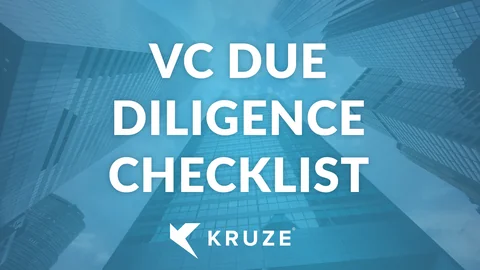
As the leading CPA 100% dedicated to VC-backed startups, we’ve helped over one thousand startups raise venture and seed funding – and see scores of VC due diligence checklists every month.
In this article, explain what goes into the typical due diligence checklist by stage. Scroll down to see pre-seed/seed, Series A and Series B diligence checklists based on the most recent deals we’ve advised founders on.
Due Diligence By Funding Stage
In Silicon Valley, the amount of effort put into diligence dramatically increases depending on the stage of the investment. Pre-seed and seed stage companies don’t have reams of historical financial data and customer interactions to investigate, whereas Series B and beyond companies have customer data, product usage, operational histories, and complex financial records that require deep, thorough examination. Let’s dive into the major items that VCs will examine by stage.
Pre-Seed/Seed Stage Due Diligence
- Focus: Founding team, market opportunity, core idea.
- Management Team: Skill sets, dedication, and ability to execute.
- Market Validation: Addressable market size.
- GTM: Coherent, high-level go-to-market ideas.
- Product: MVP or prototype, initial customer validation.
- Legal: Ensuring the company is correctly incorporated, intellectual property (if any) is protected.
- Finances: Basic financial model, use of funds, and burn rate.
- Accounting and Tax Compliance: Verification that the company has separate bank accounts for business purposes and that there is no commingling of personal and business expenses. Initial assessment of the company’s commitment to maintaining proper financial records.
- Checklist Complexity: Simple, often delivered via email text.
Series A Due Diligence
- Focus: Product-market fit, initial traction, scalability.
- Management Team: Expanded team capabilities and fit; success recruiting top-tier talent.
- Market Validation: Revenue, user engagement, proof of demand.
- GTM: One or more successful, scalable GTM channels executing at respectable CAC.
- Product: Roadmap, technology stack.
- Legal: Intellectual property, compliance checks, existing contracts.
- Finances: Detailed GAAP financial statements, cash flow projections, unit economics.
- Accounting and Tax Compliance: More formalized accounting processes, adherence to tax obligations.
- Checklist Complexity: More complex for product, sales & marketing diligence, modest accounting checklist complexity, typically delivered as a PDF attachment in an email.
Series B Due Diligence
- Focus: Scaling, operational efficiency, profitability path.
- Management Team: C-suite and key management.
- Market Validation: Growth, customer retention, market share.
- GTM: Functioning GTM system and team that can scale at attractive CACs.
- Product: Maturity, scalability.
- Legal: Expanded compliance checks, employee contracts, potential litigation risks.
- Finances: Historical performance, revenue diversification, capital allocation.
- Accounting and Tax Compliance: Mature accounting practices, multi-jurisdiction tax compliance if expanding geographically, prepared to be audited (may not be required, but should be able to do an audit if needed).
- Checklist Complexity: Highly complex diligence around customer metrics, sales and marketing, expect detailed questions on margins and strategic accounting items, and a long list of accounting and tax files; typically delivered as a PDF attachment in an email.
Series C and Beyond Due Diligence
- Focus: Market leadership, new market or product expansion, corporate governance.
- Management Team: Experience in scaling, potentially going public or being acquired.
- Market Validation: Market leadership, competitive positioning, health of underlying market.
- GTM: Best in market GTM team, strategy and systems with highly-scalable, cost-effective channels.
- Product: Intellectual property portfolio, featureset competitive advantages.
- Legal and Regulatory: More stringent legal checks, compliance in multiple jurisdictions, preparations for IPO or acquisition.
- Finances: Comprehensive financial models, EBITDA, public market readiness (if relevant).
- Accounting and Tax Compliance: Complete audits, preparation for public scrutiny, international tax compliance, and planning.
- Checklist Complexity: Highly complex diligence around customer metrics, sales and marketing; likely outsourced accounting and tax diligence to sophisticated accounting firm who will produce a minutely detailed report; checklist will be delivered by a variety of spreadsheets and PDFs.
The diligence process intensifies at each stage to match the increasing complexity and stakes of the investment. Early stages focus on potential and basic compliance, while later stages scrutinize performance, scalability, and adherence to more complex legal and regulatory standards.
Downloadable Due Diligence Checklists
Startups are complicated, and investors don’t want to miss important details when they’re considering funding your business. So they’ll go through a due diligence process to assess and evaluate your startup. We’ve compiled checklists of common items that venture capitalists and other investors might request during the diligence process, to help you start assembling the information. We’ve also included descriptions of each item and reasons why investors want to see it. The checklists are separated into company stages.
Remember: Every deal is different, and your investors may ask for other information that’s not on these checklists. If you’re going through diligence, make sure to consult your legal counsel and accounting team.
Interactive Due Diligence Checklist
This interactive due diligence checklist template lists out many of the items that VCs and professional investors will ask for - by stage. Simply click to expand each section, and then will see a list of items, and then to the right a table that indicates at which stages investors are likely to ask for any specific item.
NOTE: All parties to any financing agreement should consult with their legal counsel and accounting advisors for specific due diligence requirements related to their individual circumstances, investing goals, and business requirements.












